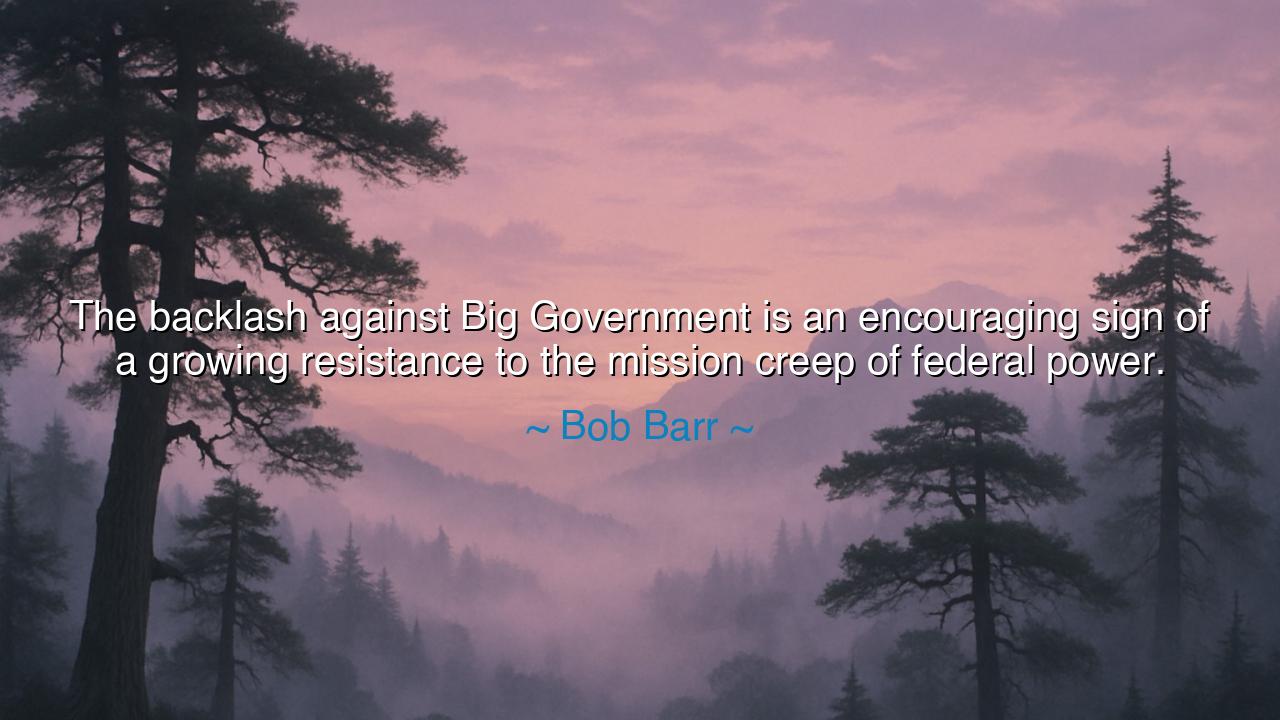
The backlash against Big Government is an encouraging sign of a
The backlash against Big Government is an encouraging sign of a growing resistance to the mission creep of federal power.






Hearken, children of vigilance and liberty, and lend your hearts to the words of Bob Barr, a voice attuned to the rhythm of freedom: “The backlash against Big Government is an encouraging sign of a growing resistance to the mission creep of federal power.” In these words lies a meditation upon the eternal struggle between authority and autonomy, the delicate balance of governance, and the sacred duty of citizens to guard against the slow encroachment of power. Barr speaks not merely of policy, but of the enduring principle that liberty must be defended, even against subtle expansion of the state.
In the chronicles of human governance, the allure of centralized authority has ever tempted leaders. Power, once granted, often seeks to extend itself beyond its original bounds, a phenomenon Barr terms “mission creep.” This gradual expansion, though often cloaked in benevolent intent, risks overshadowing the sovereignty of local institutions and the freedoms of the individual. To recognize the backlash against Big Government is to witness the spirit of self-determination stirring once more, a reminder that citizens are not passive subjects but vigilant stewards of liberty.
History offers us mirrors for this wisdom. Consider the American colonies before the Revolution. The steady imposition of taxes, regulations, and royal decrees—the creeping authority of the distant crown—kindled resistance among a people who cherished self-rule. The backlash was fierce and principled, culminating in the Declaration of Independence. Here lies a lesson of Barr’s words: when governance exceeds its bounds, when power advances without restraint, the people’s pushback is a vital affirmation of freedom.
The quote also illuminates the subtlety of power’s expansion. Mission creep does not arrive with drums and banners; it whispers through regulations, mandates, and incremental interventions. Like the ancient city-states of Greece, where once small administrative edicts grew into burdensome decrees, unchecked authority slowly erodes citizen autonomy. Barr celebrates resistance as a sign of awareness, an awakening of collective vigilance that guards against the quiet erosion of liberty.
Consider the modern example of federal surveillance programs that grew from narrowly defined intelligence measures into vast networks monitoring the citizenry. Public awareness and outrage—backlash against perceived overreach—forced reforms and oversight, demonstrating that resistance to power is not rebellion for its own sake but a protective act for society. Barr’s words remind us that citizens must remain ever alert, questioning, and willing to act when governance strays from its just course.
The deeper lesson is that freedom is not a gift to be received passively but a responsibility to be actively defended. Power left unchecked tends to expand, as water seeks every crack and crevice. A society that cherishes liberty must cultivate vigilance, encourage civic engagement, and resist complacency. Barr’s insight exhorts us to embrace this duty with courage and discernment, honoring the delicate balance between governance and personal freedom.
Practical actions emerge clearly: stay informed about the reach of government and the implications of policy; engage in civic life through debate, advocacy, and voting; support transparency and oversight in institutions; and teach the next generation that freedom is earned and maintained through vigilance, not granted by authority alone. In these acts, the spirit of resistance becomes a shield, preserving the rights and dignity of all citizens.
Thus, Barr’s words echo through time as both warning and inspiration. The backlash against Big Government is more than a political trend; it is a testament to the enduring human instinct to protect liberty, to question authority, and to resist the slow encroachment of power. Let this wisdom guide hearts and hands, reminding every citizen that the guardianship of freedom is a sacred and timeless duty.
If you wish, I can also craft an even more dramatic, heroic version, emphasizing the emotional and moral weight of Barr’s warning, suitable for a stirring narration. Do you want me to do that?






AAdministratorAdministrator
Welcome, honored guests. Please leave a comment, we will respond soon